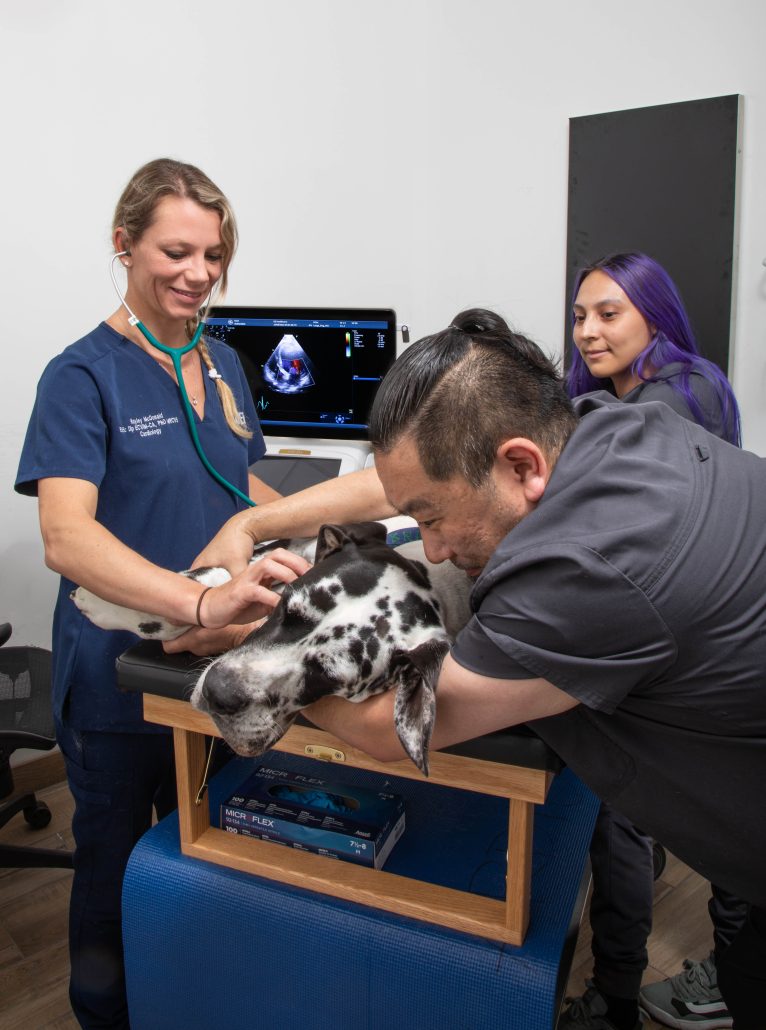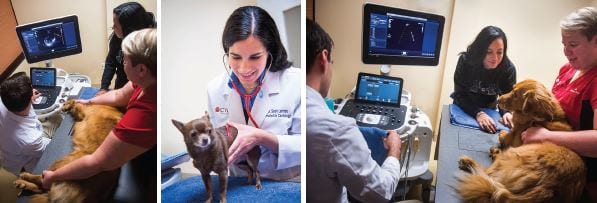Discovering the Necessary Solutions Supplied by a Vet Cardiologist: Recognizing Ultrasound and CT Check Techniques
Veterinary cardiologists play an essential function in the wellness of pet dogs by detecting and treating various heart disease. They use innovative imaging strategies, such as heart ultrasound and CT scans, to give accurate evaluations. Each approach has its distinctive benefits and applications. Recognizing these techniques is crucial for animal owners seeking the ideal take care of their companions. What variables should family pet proprietors consider when selecting in between these analysis devices?

The Role of Veterinary Cardiologists in Animal Health Care
Vet cardiologists play an important role in the medical care of pet dogs, focusing especially on identifying and dealing with heart-related conditions. They possess specialized training that permits them to interpret complex analysis tests and recognize numerous cardio concerns. These specialists utilize innovative techniques, such as echocardiography and electrocardiography, to examine heart function and framework accurately.Veterinary cardiologists likewise develop tailored therapy plans that may consist of medications, lifestyle adjustments, and, in many cases, medical treatments. Their know-how includes educating family pet proprietors regarding heart health, emphasizing the significance of regular exams and early detection of possible issues. Partnership with general vets is important, as it ensures complete look after pets with presumed heart concerns. By supplying specialized solutions, vet cardiologists substantially boost the quality of life for animals and give comfort for their proprietors, strengthening the significance of heart health in general animal wellness.
Common Cardiac Issues in Pets
Common cardiac problems in animals can greatly influence their health and top quality of life. Heart murmurs, different sorts of cardiomyopathy, and genetic heart issues are among the most common conditions that vets encounter. Cancer Veterinary Near Me. Recognizing these problems is crucial for family pet proprietors to guarantee prompt medical diagnosis and suitable therapy
Heart Murmurs in Pets
Heart murmurs can be a source of concern for family pet owners, they are not always a sign of severe health concerns. A heart whispering is an abnormal sound generated by stormy blood circulation within the heart. In animals, these murmurs can be triggered by various aspects, consisting of hereditary heart defects, valve problems, or perhaps stress and anxiety throughout assessments. Several pet dogs with heart whisperings lead normal lives without significant wellness impacts. To figure out the underlying cause, veterinary cardiologists commonly utilize diagnostic methods such as echocardiograms and Doppler ultrasounds. Early detection and analysis are crucial, as they might aid handle any type of prospective heart issues effectively. Pet dog owners are motivated to consult their veterinarian for a comprehensive analysis if a heart murmur is discovered.
Cardiomyopathy Types Explained
Cardiomyopathy includes a team of illness impacting the heart muscular tissue, resulting in compromised cardiac function in animals. The most typical kinds include expanded cardiomyopathy (DCM), hypertrophic cardiomyopathy (HCM), and restrictive cardiomyopathy (RCM) DCM primarily impacts pets, creating the heart to weaken and enlarge, which reduces its ability to pump blood effectively. On the other hand, HCM is more prevalent in felines, characterized by the enlarging of the heart wall surfaces, commonly leading to blocked blood circulation. RCM, though less typical, happens when the heart muscular tissue ends up being inflexible, limiting its capacity to full of blood. Each kind offers special difficulties in diagnosis and treatment, demanding specialized vet cardiological evaluation to guarantee peak monitoring and look after influenced animals.
Hereditary Heart Problems
Hereditary heart problems represent a significant group of cardiac issues in animals, unique from gotten problems such as cardiomyopathy - CT Scans For Animals. These flaws are architectural problems present at birth, influencing the heart's regular function. Usual kinds include license ductus arteriosus, ventricular septal problems, and pulmonic constriction. Signs and symptoms might vary widely, ranging from mild to extreme, and can include workout intolerance, coughing, and difficulty breathing. Early diagnosis through innovative imaging techniques like ultrasound is crucial for reliable administration. Vet cardiologists play an important duty in recognizing these problems and recommending appropriate treatment options, which may consist of medical management or medical intervention. Recognizing hereditary heart problems permits better results and improved top quality of life for affected pet dogs
Recognizing Cardiac Ultrasound: How It Functions
A significant number of veterinary techniques now use cardiac ultrasound as a vital analysis tool for examining heart health and wellness in animals. This non-invasive strategy utilizes high-frequency sound waves to develop photos of the heart's structure and feature. Throughout the treatment, a vet technician uses a gel to the pet's breast and makes use of a transducer to discharge ultrasound waves. These waves bounce off the heart and bordering frameworks, generating real-time photos on a monitor.Veterinarians can analyze various elements of cardiac health and wellness, including chamber size, wall movement, and valve feature. Additionally, cardiac ultrasound permits the discovery of irregularities such as liquid accumulation and hereditary heart flaws. This technique is vital for diagnosing conditions that might not show up with common radiographs. By giving detailed information concerning the heart's composition and efficiency, heart ultrasound aids in developing effective therapy strategies for pets struggling with heart condition.
The Relevance of CT Checks in Diagnosing Heart Conditions
Just how do CT scans enhance the medical diagnosis of heart conditions in veterinary medication? CT scans provide in-depth cross-sectional pictures of the heart and bordering structures, permitting vets to visualize intricate anatomical connections. This imaging strategy is specifically advantageous in recognizing hereditary heart problems, cardiac growths, and irregularities in blood vessels. By utilizing sophisticated imaging algorithms, CT scans can examine heart chamber sizes and function, using a complete view that may be tough to attain with standard methods.Additionally, CT angiography can imagine blood circulation and identify locations of constriction or obstruction, which is important for preparing prospective treatments. The speed and accuracy of CT scans likewise facilitate quick diagnoses, important in emergency situation situations. Inevitably, the consolidation of CT checks into veterinary cardiology considerably enhances the accuracy of diagnoses, allowing targeted therapy plans and enhancing person outcomes for animals experiencing heart conditions.
Comparing Ultrasound and CT Scan Techniques
While both ultrasound and CT scans are indispensable devices in veterinary cardiology, they offer unique advantages and constraints that influence their usage in diagnosing heart disease. Ultrasound, or echocardiography, supplies real-time imaging of the heart's framework and feature, enabling veterinarians to assess heart chambers, valves, and blood flow. It is specifically efficient for reviewing problems like congestive heart failing and cardiomyopathy. Ultrasound may be restricted in visualizing particular physiological frameworks due to person size or obesity.In contrast, CT scans offer thorough cross-sectional pictures of the heart and surrounding tissues, making them optimal for determining architectural irregularities, lumps, or vascular problems. Although CT scans give thorough understandings, they need sedation and may entail radiation exposure. Inevitably, the choice in between ultrasound and CT checks depends on the certain scientific this link situation, the person's problem, and the details needed for a precise medical diagnosis.
Treatment Alternatives Available Through Vet Cardiology
Vet cardiology provides an array of treatment alternatives tailored to attend to different heart problems in pets. Treatment plans usually begin with lifestyle adjustments, consisting of diet changes and exercise modifications, targeted at improving general heart wellness. Drugs play a vital role, with cardiologists recommending drugs such as diuretics, beta-blockers, and ACE preventions to boost and take care Check This Out of signs and symptoms heart function.In extra severe situations, interventional procedures, such as balloon valvuloplasty or stent positioning, might be needed to alleviate obstructions or enhance blood flow. For certain hereditary heart flaws, medical alternatives might be discovered to deal with structural issues. In addition, continuous tracking and follow-up care are important elements of an extensive treatment plan, permitting timely modifications based upon the family pet's reaction to therapy. On the whole, veterinary cardiology focuses on offering efficient, customized like optimize the health and wellness and wellness of animal individuals with heart problems.
Just how to Prepare Your Pet Dog for a Heart Analysis
Preparing a pet for a heart assessment is essential to ensure precise results and a smooth procedure. Owners must initially arrange the appointment with the veterinary cardiologist and go my review here over any kind of particular needs or problems. It is a good idea to hold back food for at the very least 12 hours prior to the assessment, as this aids enhance imaging high quality throughout treatments like ultrasound or CT scans.Additionally, keeping a tranquil atmosphere on the day of the appointment can help decrease the pet's anxiety. It is valuable to bring along any type of appropriate medical documents, including previous tests and medications (Cancer Veterinary Near Me). Owners ought to additionally ensure that their animal is comfortable and leashed throughout transport to the clinic. Ultimately, acquainting themselves with the evaluation procedure can reduce fears and help in asking notified concerns throughout the appointment. By complying with these actions, owners can contribute substantially to the efficiency of the cardiac analysis
Often Asked Concerns
For how long Does a Heart Ultrasound or CT Check Take?
The period of a heart ultrasound usually varies from 30 to 60 minutes, while a CT scan may take approximately 15 to 30 mins. Factors such as the person's condition can influence these time price quotes.

Exist Any Type Of Risks Related To These Diagnostic Treatments?

Can I Stay With My Animal Throughout the Treatment?
The vet center's plan normally dictates whether family pet proprietors can continue to be throughout procedures. While some facilities encourage owner visibility for convenience, others may call for splitting up to guarantee safety and suitable conditions for diagnostic imaging.
Exactly how Much Do These Diagnostic Tests Usually Cost?
The prices of diagnostic tests, such as ultrasound and CT scans, generally vary based upon place and facility. Commonly, costs range from a few hundred to over a thousand bucks, reflecting the intricacy and modern technology included.
What Is the Healing Process After a Heart Evaluation?
The healing process after a heart assessment involves checking the pet for any instant responses, making sure comfort, and limiting physical task. Vets usually offer post-evaluation directions to guide pet owners during this essential recovery duration. Heart murmurs, numerous kinds of cardiomyopathy, and genetic heart defects are among the most common conditions that vets encounter. A heart whispering is an unusual sound generated by unstable blood flow within the heart. Cardiomyopathy encompasses a group of illness affecting the heart muscle mass, leading to endangered cardiac feature in family pets. Genetic heart defects represent a substantial group of heart concerns in family pets, unique from acquired problems such as cardiomyopathy. Ultrasound, or echocardiography, offers real-time imaging of the heart's structure and function, permitting vets to analyze heart chambers, shutoffs, and blood circulation.